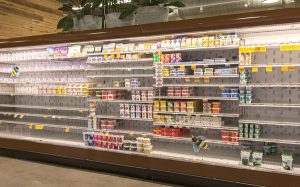
 Honey bees are an essential part of agriculture and plant life in North America, being a major pollinator of everyday foods such as cranberries, blueberries, tomatoes, apples, and numerous other crops (Schuster). Without bees, we would be left without a key pollinator and without pollination, there would be no more plants, no more animals, and no more man (Latsch). The bee colony crash is thought to be a result of the mass amount of pesticides used on agriculture, creating a toxic pesticide cocktail, and from genetically modified crops. Agriculture has become an increasingly industrialized industry, making it easier to mass produce crops to feed our growing society. While industrialization has countless benefits, the expansion of genetically modified crops and the increased use of pesticides may be doing more harm than good.
Honey bees are an essential part of agriculture and plant life in North America, being a major pollinator of everyday foods such as cranberries, blueberries, tomatoes, apples, and numerous other crops (Schuster). Without bees, we would be left without a key pollinator and without pollination, there would be no more plants, no more animals, and no more man (Latsch). The bee colony crash is thought to be a result of the mass amount of pesticides used on agriculture, creating a toxic pesticide cocktail, and from genetically modified crops. Agriculture has become an increasingly industrialized industry, making it easier to mass produce crops to feed our growing society. While industrialization has countless benefits, the expansion of genetically modified crops and the increased use of pesticides may be doing more harm than good.
Genetically modified corn, for example, carries a bacterial toxin that has “altered the surface of the bee’s intestines, sufficiently weakening the bees to allow the parasites to gain entry” (Latsch). By genetically modifying plants and making them insect-resistant, this is damaging the fragile bee population’s immune systems, making them more susceptible to diseases. We must ban the use of pesticides and other toxic chemicals and purse a more organic direction.
If the bee colonies were to collapse, effects would be seen around the world. Pollination is integral to the production of our food supply and our economy not only in the United States, but globally. In an effort to raise awareness of the various serious dilemma, a Whole Foods store showed its customers what would happen to grocery stores if bees went extinct. Customers were shown what the dairy isle would look like without honeybees and it was made clear that there would be no more fruit-flavored yogurt or chocolate. Cows graze on many plants that would die out, causing milk to be scare as well and Whole Foods estimates that more than half of the produce department is dependent on bees (Friedman), so say goodbye to the majority of the produce supply. In fact, 70 out of the top 100 human food crops, which supply about 90 percent of the worlds nutrition, are pollinated by bees. It is time to start paying attention to bees and taking action to prevent their extinction, which would greatly our everyday lives and economy.
Latsch, Gunther. (2013). In Germany and the United States, Bee Colony Crashes May Be Linked to Genetically Modified Crops. Genetic Engineering, 73-79. July 8, 2017.
Friedman, Megan. (2017). Here’s What Would Happen to Your Groceries If Bees Went Extinct. Good Housekeeping, Aug. 11, 2016.
Schuster, Ruth. (2017). Why save Wild Bees: Do You like Tomatoes?. Haaretz.com. 08 July 2017.
